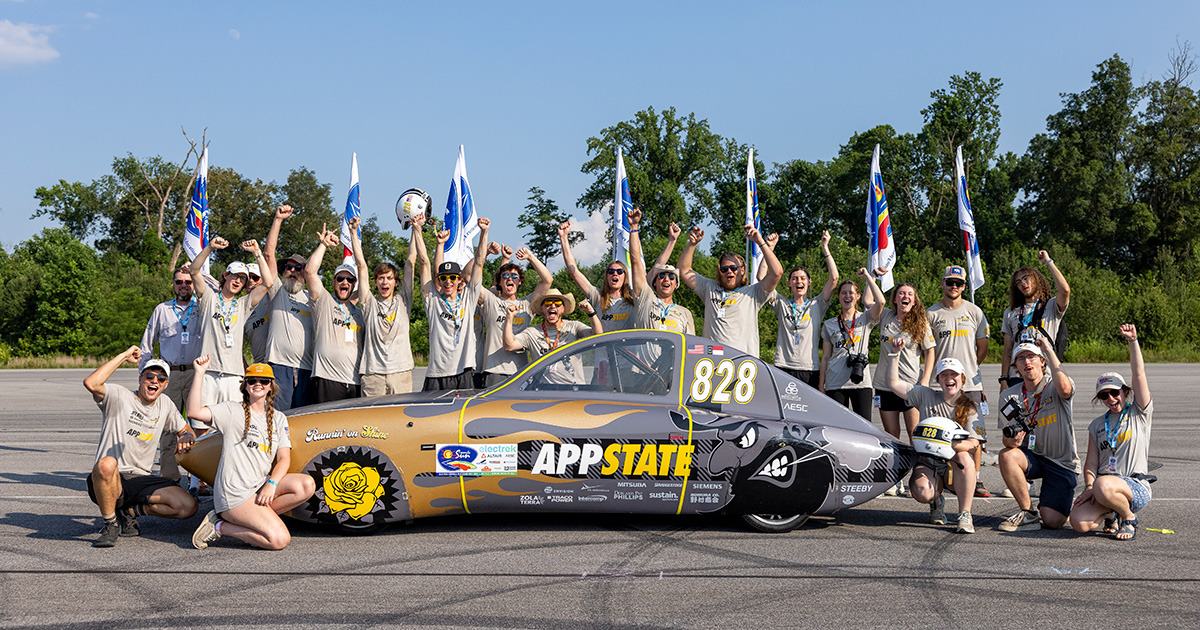Appalachian State University's Team Sunergy has once again demonstrated its prowess in the realm of solar vehicle competitions. The team secured a commendable second-place finish in the multi-occupant vehicle category at the 2025 Electrek Formula Sun Grand Prix, a testament to their dedication and innovative spirit.
Recognition for Teamwork and Innovation
In addition to their impressive standing in the competition, Team Sunergy was honored with the Abe Poot Teamwork Award. This accolade is a recognition of their exemplary collaboration and the collective effort that underpinned their success. The award highlights the importance of teamwork in achieving technological advancements and competitive excellence.
"The Abe Poot Teamwork Award is a testament to the synergy and collaborative spirit of our team. It reinforces our commitment to innovation and sustainable technology," said a representative from Team Sunergy.
Advancing Solar Vehicle Technology
Team Sunergy, known for its consistent excellence in solar vehicle competitions, is not resting on its laurels. The team is already channeling its efforts into the development of a new, more advanced solar vehicle. This initiative is aimed at pushing the boundaries of solar technology and enhancing their competitive edge in future races.
The pursuit of advanced solar vehicle technology is not just about winning races. It is a critical endeavor that aligns with global sustainability goals and the transition to renewable energy sources. As the world grapples with climate change, initiatives like those undertaken by Team Sunergy are vital in demonstrating the viability and potential of solar energy.
Implications for the Future
The achievements of Team Sunergy at the Formula Sun Grand Prix underscore the growing importance of innovation in renewable energy technologies. As educational institutions like Appalachian State University invest in such projects, they not only prepare students for future challenges but also contribute to the broader societal shift towards sustainable practices.
However, the journey towards advanced solar vehicles is fraught with challenges, including the need for continuous research, funding, and policy support. As these technologies evolve, regulatory frameworks must also adapt to ensure safety, reliability, and widespread adoption.
Originally published at https://today.appstate.edu/2025/07/14/sunergy
ResearchWize Editorial Insight
The article on Appalachian State University's Team Sunergy matters for students and researchers because it highlights the intersection of education, innovation, and sustainability. Team Sunergy's success at the Formula Sun Grand Prix showcases the potential of solar vehicle technology, which is crucial in the global shift towards renewable energy.
For students, this is a real-world application of engineering and teamwork, emphasizing the importance of collaboration in achieving technological breakthroughs. It serves as a motivational case study, illustrating how academic projects can have tangible impacts on pressing global issues like climate change.
Researchers can glean insights into the challenges and opportunities in advancing solar technology. The team's ongoing efforts to develop more advanced solar vehicles reflect the need for continuous innovation, which is critical for staying competitive and relevant in the field.
The article also raises questions about the role of educational institutions in driving sustainable practices and how they can influence policy and industry standards. As solar technology evolves, what systemic changes are necessary to support its integration into mainstream energy solutions? How can academia and industry collaborate to overcome the hurdles of funding and regulatory adaptation?
In essence, Team Sunergy's achievements are not just about winning a race; they are about contributing to a sustainable future. This narrative is vital for inspiring the next generation of innovators and for informing research that can lead to significant environmental and societal benefits.
Looking Ahead
1. Redefining Curriculums AI is no longer the future; it's the present. Yet, our educational curriculums lag behind. Schools and universities continue to teach outdated programming languages and theoretical concepts while the AI landscape shifts beneath their feet. Are we preparing students for a world that no longer exists?
2. Ethics and Policy Integration The integration of AI ethics into the educational framework is not optional—it's a necessity. As AI systems increasingly influence decision-making, students must be equipped with the skills to navigate and challenge ethical dilemmas. What happens if our future leaders are trained to build but not to question?
3. Adaptive Learning Technologies AI-driven adaptive learning platforms can personalize education, but are they being implemented effectively? These tools promise to tailor learning experiences to individual needs, yet adoption is sporadic. Will educational institutions embrace this technology or remain shackled to traditional teaching methods?
4. Interdisciplinary Approach AI is not confined to computer science. Its applications span economics, healthcare, and environmental science. An interdisciplinary approach to AI education is crucial. Are we fostering a generation of siloed specialists or versatile problem-solvers?
5. Regulatory Oversight As AI technologies evolve, regulatory frameworks must keep pace. Educational institutions could play a pivotal role in shaping these policies by fostering dialogue between students, academics, and policymakers. What if regulators fall behind, leaving gaps in oversight that could lead to misuse or abuse?
6. Investment in Research and Development Funding for AI research in educational settings remains inadequate. Institutions must prioritize investment in cutting-edge AI projects to remain competitive globally. Can we afford to ignore the financial implications of underfunding AI education?
7. Global Collaboration AI transcends borders. Collaborative international projects offer students exposure to diverse perspectives and problem-solving techniques. Are we encouraging our students to think globally or merely preparing them for local challenges?
Related Articles
- Best AI PDF Summarizers 2025 – Top 11 Tools for Quick Summaries
- CESHS’s Tingting Li awarded fellowship for AI and science ed research
- 50 NEW Artificial Intelligence Statistics (June 2025)
📌 Take the Next Step with ResearchWize
Want to supercharge your studying with AI? Install the ResearchWize browser extension today and unlock powerful tools for summaries, citations, and research organization.
Not sure yet? Learn more about how ResearchWize helps students succeed.

